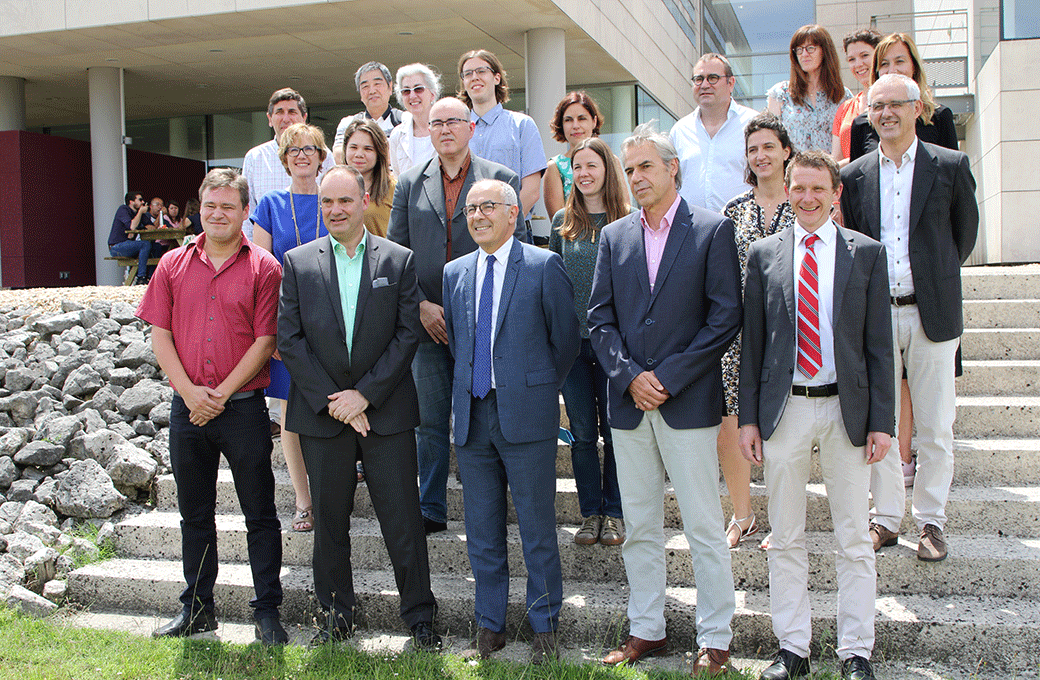Context of the General Assembly
On Monday, June 24th, representatives of the BAG Alliance - Bordeaux, Adelaide, Geisenheim - gathered for the annual General Assembly which brought together about thirty international researchers.
After reviewing the research projects carried out over the past five years, Researchers and Unit Directors were able to present future research projects and related topics.
These new research themes were then transcribed in the new MOU agreement, which will renew the BAG alliance until 2024. The convention or MOU, was signed by Manuel Tunon de Lara, President of the University of Bordeaux, Hans Schultz, President of the University of Geisenheim, Dan Johnson, Director of AWRI represented today by Markus Herderich, with representatives of the Land of Hesse and the New Aquitaine region.
The stakes of this signature are to continue to develop the work project initiated in the adaptation to climate change, sustainable agriculture and in line with the project vitiREV where it meets the demand for responsible viticulture rooted in its territory and in its history, an innovative viticulture engaged in the digital transition (link with LABEX SISNUM), with a view to building territories that are exemplary in all dimensions of sustainable development (link with LABEX COTE).
PhD theses in co-supervision have been prioritized in this context.
Content of the MOU agreement
The convention (Memorandum of Understanding) is an extension of the agreements already signed for the next 5 years with new thematic priorities:
- Impacts of climate change on viticulture and adaptation strategies
- Increase in the efficiency of use of nutrients and water
- Sustainable wine growing, production and marketing of wine
- Resistance to pests and diseases
- Agroecology and Ecosystem Support Services in Viticulture
- Microorganisms of soil, vines and wines and their influence on typicity and authenticity
- Digitization of viticultural and viticultural processes
- Metabolomics of the plant to the wine
- Genetic resources of the vine and genomics
- Profitable production, consumer perception and marketing of new varieties
Challenges for the future
A first OENOCLIM ADAPT project (Aquitaine Region - University of Bordeaux / University of Geisenheim - Land of Hesse) was prepared within the framework of the BAG Alliance with 4 PhD theses.
It contributes to the acceleration of innovation so that the actors of the territories become co-creators of the innovation, the problems of climate change and an eco-responsible culture of the vine being common to the 2 regions Land of Hesse and New Aquitaine.
The expected spinoffs are both at the academic level for the University of Geisenheim (HGU) and the University of Bordeaux (ISVV) and the 2 Regions New Aquitaine and Land of Hesse. Comparing research work on: adaptation to drought, good practices to reduce the use of pesticides, the effect of increasing carbon dioxide on the physiology of grapes and berries, prevention organoleptic deviations of wines between regions and countries, will enrich both the approaches / models of research work and the possibilities of adaptations to the vineyard and the cellar from the results of the project actions. New young researchers from the different institutes will be able to specialize and bring new skills by developing innovations in the new key areas for the vine growers of the Regions involved in this agreement.
History of the BAG Alliance
The BAG Alliance (Bordeaux-Adélaïde-Geisenheim) is a trilateral partnership in the fields of vine and wine research, advanced training and technology transfer. In October 2010, the representatives of the three largest wine and grape research organizations in the world, the Institute of Vine and Wine Sciences (ISVV) (Bordeaux, France), the University Hochschule Geisenheim (HGU) (Geisenheim, Germany) and the Australian Wine Research Institute (AWRI) (Adelaide, Australia) have signed a Memorandum of Understanding for the creation of a new alliance for viticultural research.
The Institute of Vine and Wine Sciences (ISVV) brings together research teams from the Aquitaine region, whose activities concern viticulture and the wine industry. Its activities include research, consulting and higher education in viticulture-oenology and social sciences.
Hochschule Geisenheim University (HGU) is a research, higher education and knowledge transfer institution focused on topics covering the entire value chain, from production to the marketing of special crops and their products. (mainly drinks), as well as the development of rural and urban spaces.
The institutions aim to achieve a number of strategic benefits for their respective vineyard, grape and wine industries under the alliance, including:
• an ability to address global issues such as the environment, the rational use of water, climate change and wine quality and its place in society (including the impact of wine on human health) ;
• Capitalize on strong synergies between institutions - collectively, institutions provide world-class expertise and infrastructure for every aspect of the wine value chain, thus creating the world's first "critical mass".


 Access map
Access map

